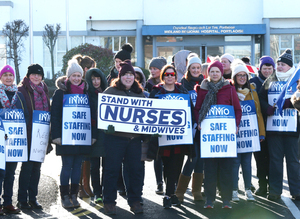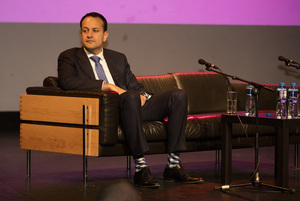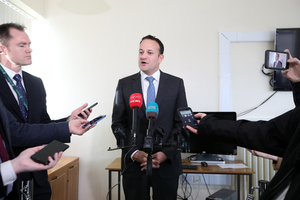

 From top: INMO members outside the Midlands Regional Hospital, Portlaoise; Irish media coverage of the dispute last week; Bryan Wall
From top: INMO members outside the Midlands Regional Hospital, Portlaoise; Irish media coverage of the dispute last week; Bryan Wall
With nurses set to strike again later this month, the government finds itself in a difficult position.
Does it acquiesce to the wishes of the nurses and their idea that decent pay and conditions be a prerequisite for being such an integral part of healthcare?
Or does it continue down the well-worn road of ignoring the wishes and needs of the wider population in service of the greater needs of profit and market discipline?
Given the stridency of the government thus far, the latter is the likely outcome.
The status quo must hold. Workers simply asking for a fair income and decent conditions is too much. To give in now might give other workers ideas about their role in society. It might also give them ideas about the value assigned to them by the government and its lackeys.
The media of course has played its own role in all of this. Yes, the strikes are reported on. But often they have been reported on in the context of the effects on patients.
Headlines across the Irish media reflected this adherence to the government’s stance.
This playing to the emotions of people, trying to pit them against nurses is a tactic commonly used. During the water charge protests we had “sinister fringes” who would unleash anarchy. And now we have nurses who are putting the lives of patients at risk by striking.
In the Irish Independent one article led with the headline, “Hundreds of people with an intellectual disability to be affected as nurses escalate strike threat”. This “escalation” would “mean many more vulnerable people will be hit by the strike”.
RTÉ followed suit, and reported in- and out-patient surgeries would be cancelled alongside the closing of injury units and other services.
In the Irish Examiner one could find the same warnings. Not only did they report that services across the board be cancelled but that there would be other unforeseen consequences well into the future.
Opening with the point of view of a Health Service Executive (HSE) representative, the following was reported:
“The knock-on effect of cancelled procedures and appointments due to the nurses’ strike will be felt for some time, the HSE says.”
Further down the article we find out what was actually said by the HSE representative. He warned “There will be a cumulative effect which would be quite significant” if there are further strikes.
The Irish Times was also no exception. Only the disruption to patients was worthy of attention. Of note is the mention of the government’s wish to “re-engage in talks to find a resolution to the current nurses’ dispute.” No word of the sanctions mentioned by Simon Harris or SIPTU.
That honour was left to the Irish Independent who, quoting the Health Minister, wrote that “financial penalties against nurses will be considered”.
According to Harris although the government “‘isn’t in that space today’”, nonetheless, “‘The Department of Public Expenditure and Reform will legally consider that in the coming days and weeks’”.
In the same piece the government line that a raise is unaffordable and beyond the realms of consideration given the imminence of Brexit was reiterated.
Also in the Irish Independent was a piece declaring that the government is “not just facing a showdown with nurses — they’ve also got the public sector union leadership breathing down their necks.” If the nurses are successful other unions will “dust[…] off their begging bowls” in a “free-for-all”.
Any idea that the nurses are financially struggling was put to rest as The Irish Times stepped into the fray to offer their own financial interpretation.
Pay for nurses is higher here than in the UK according to the piece. Ireland lags behind in entry-level pay compared to Australia and Canada but overall ranks fifth out of thirty countries in terms of pay for nurses.
In the same piece it is pointed out that the Department of Public Spending calculates the average pay of nurses to be €57,600 per annum.
It is only at the end of the article that it is revealed – almost in passing – that someone earning that amount would struggle to pay rent in parts of Dublin. Two incomes would be needed to afford a rental home. The implications of this, if not obvious, are spelled out quite clearly in the next paragraph.
Unless the high cost of housing is addressed, the author writes, “militancy will only grow, particularly among younger age groups.” It is known that hardship and economic and social unfairness, let alone inequality, breed radicalism; hence, the warning about militancy.
Regardless, the government must stand firm given the influx of “begging bowls” headed its way otherwise. What emerges in the subtext is a rehashing of Michael Noonan’s “we govern for the reasonable” worldview.
All of this is in the name of “journalistic balance”. Some people want fairness in how they are paid and treated, therefore the opposite view must be given due attention for the sake of impartiality.
This does nothing more than mask the suffering of those protesting and the unfairness of a system in which they are under-appreciated, undervalued, and underpaid. What was missing from the piece in The Irish Times was the economic context of the comparison between NHS and Irish nurses.
Nurses in Ireland being paid more compared to nurses in the UK is meaningless. Across the Irish Sea the NHS has been under attack in the shape of market reforms, i.e., privatisation.
Therefore, comparing the pay of Irish nurses to the pay of nurses in a health system that is being dismantled does not support that government’s argument that nurses here are well compensated. In fact, it does the opposite.
Only by holding the financial compensation of nursing staff here to such a low standard can the government and its apologists defend the current pay levels.
Of course the long hours nurses work are of no risk to patients. Neither is understaffing, underpay, stress, burnout, and the toll all of this takes on the mental and physical health of the nurses.
These are part of the system they signed up too. So they should just shut up and deal with it. Accept the crumbs flung their way from the economic table and be happy that they do not suffer the indignity of having to govern the country.
These are not the “missteps” of a government out of touch with the workers. This is a government that knows exactly what it is doing. In a situation like this, militancy is the only appropriate response.
And fearing this, expect an even harder government line to emerge.
Bryan Wall is an independent journalist based in Cork. His column appears here every Monday. Read more of his work here






Thanks for this Bryan. Tis amazing that the government can blow €2billion on a vanity project but won’t invest in front line staff..
That money wasn’t blown, that would suggest something getting out of hand.
The reality will come out in 10-20 years and by that stage……
Repeat ad infinitum.
A tribunal?
We now know what went wrong but we’re not going to punish anyone.
That’s about the size of it alright Jonjo.
Depressing stuff.
Thanks Bryan for another Junior Cert lesson. The govt sucks, every worker deserves to be paid loads of money, we need leftist in charge to sort things out. Why not provide proper comparison of what the NHS pays its staff, and the cost of renting in London compared to Dublin. Btw, not all nurses live in Dublin. Also, why not comment on why the unions do not demand a Dublin allowance for their staff? No, against the leftist narrative.
This, but in harsher terms. Bryan Wall is an embarrassment.
why focus on comparisons? why are the irish always pointing to other countries and either saying “they do it, so we should do it” or “its worse in other countries”? why can’t we run our own ship according to what is available to us and what we can do ourselves? So let’s just fuppin forget other fuppin countries for a minute .. and maybe park your “grrr leftists grrr” bullpoopie for another minute. Now. With all that aside .. NOW, can you say why you think nurses should not get a raise. and dont say “i never said that” coz it’s pretty fuppin clear you agree with it.
I think 59k is a good wage. Do you not? And the narrative that the main stream media suggest that services will be affected due to strikes is totally right. If the staff are on strike and people are not affected WHY THE F, do we need time in the first place? More leftist nonsense. Having been in the “system” i agree that nurses do a great job But their unions are leading the the path again. Why not a regional pay system?
If you think 59k is a good wage you must be snagging turnips.
All comparisons are pointless in this dispute
And TBF it’s very unfair on Irish Nurses and Midwives
Mainly because Nursing
Is the biggest payroll charge / or cost centre in the ‘pay’ category of any Irish public hospital – HSE or Voluntary
It’s a single reporting line in the monthly IMR
I would say 60 to 70% of total pay in the Hospital Sector is allocated to ‘Nursing’
Total pay includes Medical, Porters, SuperAnn, Patient Services etc
The principal reason why comparison with any form benchmark is unfair is that of a manpower or compliment of say 1400 ‘nursing’
20 (I’m being generous here btw) might hold the title ‘Assistant Director of Nursing’ and be at the very top of their scales, with all their years in; 90k plus easily
Let’s say another 150 are Nursing Specialists, Theatre, ENTs, Bloods etc
And another 150 are Nurse Practitioners
Depending on years in – ye know yerselves
I’d say 65k basic
So ye have 320 there In Nursing, not including the Director (s) of Nursing – who oddly enough may not be at the top end of their scales or have the same bank of years serving, but would still be in the higher end
Either way it still leaves over a 1000 ‘Nursing” on flat CNM, Entry or Student basic before OT and Allowences
Ye are comparing a whole figure and dividing it with total nursing staff allocated to that particular payroll charge point
And not recognising the breakouts
For all we know Eilish Hardiman (NCH CEO) total payroll cost may still be charged to nursing in the payroll journal
I know heads of Departments that started out as Nurses are still treated under nurses by payroll accounts staff
Even the SuperAnn Manager in one location
And the Head of Infection Control in another
Strategy and Project Development Manager …
A regional head of Psychiatric Services still had his payroll managed under his starting employee number as a nurse
Same with a Regional HR manager
Ara’ I could go on
This is why I hate the use of averaging
And especially with Nursing as it’s totally misleading
And is being used in this dispute for the wrong purposes
As it’s manipulating the average pay being dished out